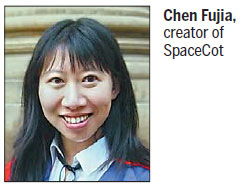Space-age entrepreneur
Updated: 2015-01-30 08:42
By Cecily Liu(China Daily Europe)
|
|||||||||||
Oxford University graduate is turning space agency's technologies into commercial baby-care products
Chen Fujia, 30, recalls that while she wanted to be a scientist as a young PhD student at the University of Oxford, she had never really planned out her life "systematically".
"I just take on new opportunities as they come," Chen says.
That time would come in 2012, when the European Space Agency held an academic competition that allowed participants to transform its technology into commercial products.
Chen used one of the agency's ultra lightweight materials to create a user-friendly baby cot called the SpaceCot that she says can be deployed and retracted in seconds.
In 2013, she then parlayed that technology into co-establishing Oxford Space Structures, which specializes in the use of space technologies to produce baby-care products.
The SpaceCot weighs less than 5 kilograms and can be folded away in under three seconds, compared to conventional products on the market that weigh about 5 kilograms and require about up to ten minutes to fold away.
Chen's team is now in the process of establishing a facility at the Suzhou Industrial Park to conduct research and development as well as manufacturing for the company's products.
"China has great capability and talent pools for these activities," she says.

She says the UK team will focus on R&D for the conversion of space technology into products, marketing, its distribution strategy and intellectual property management. The China team will focus on R&D work relating to developing new products and updating technologies.
The UK team will also focus on selling the product in Europe, while the China team will focus on sales in China. Production is likely to be outsourced to a third party manufacturer in China, she says.
The company chose Suzhou Industrial Park because of the collaboration between the park and the University of Oxford. The park has also provided Oxford Space Structures with free office space, additional funding and favorable tax policies.
Chen, who is from Shanghai, completed her bachelor's degree in textile and fashion design at Donghua University, attained her master's at Imperial College in aerospace engineering, and completed her PhD in zoology at the University of Oxford.
It was at Oxford that she met her business partner, Julian Jantke. Chen and Jantke are now both managing directors of the company. They have also invited three other experts to join their company, one of whom is Zhong You, a university lecturer at the department of engineering science at Oxford. Zhang is the lead scientist for Oxford Space Structures.
They also brought in as a non-executive director and investor Toby Burton, an independent entrepreneur and management consultant who previously worked as vice-president of Cisco Systems.
Oxford Space Structures has raised funds from government and from various programs that support startups, including the Satellite Catapult project and the Sirius program. It has also received capital from Suzhou Industrial Park and angel investors.
Chen says her team aims to raise about another 200,000 pounds (303,000; 268,000 euros) of funding to be invested into R&D, production and new product development.
Prior to setting up Oxford Space Structures, Chen worked as an engineer for Formula One, which she says was an enjoyable job but left her wanting more out of life.
"In our lab, there were many engineers, each contributing towards the end product, and sometimes within such a big team it is easy to lose sight of the bigger picture," she says.
cecily.liu@chinadaily.com.cn
( China Daily European Weekly 01/30/2015 page15)
Today's Top News
China's port project in Greece not affected
Royal Mail Chairman Brydon to step down
Trial finds GSK Ebola shot safe, with immune response
Russian Delegation stripped of voting rights at PACE
China and Greece 'willing to continue cooperation'
China hails German leaders' call to remember history
Greece's new govt halts port sale to China
Putin sets government main task of ensuring social stability
Hot Topics
Lunar probe , China growth forecasts, Emission rules get tougher, China seen through 'colored lens', International board,
Editor's Picks

|

|

|

|

|

|





